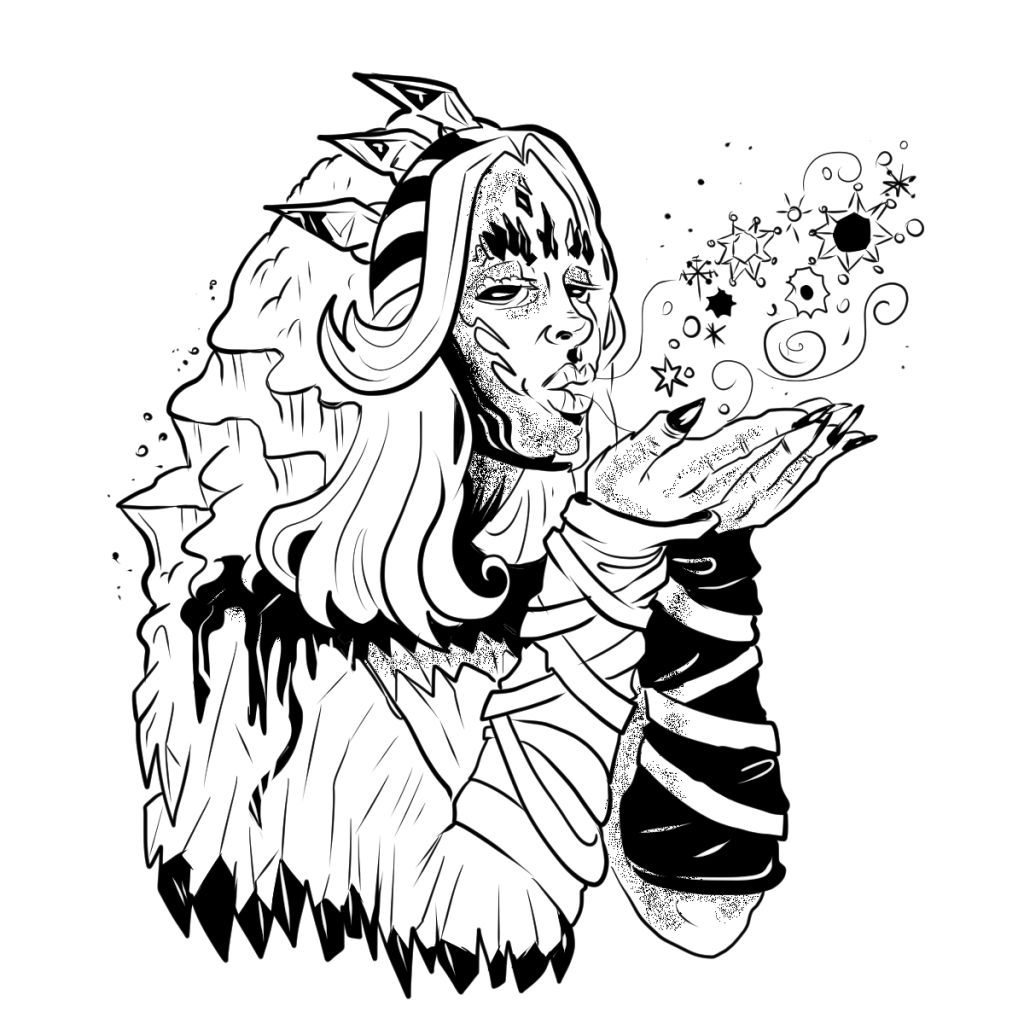
Muses are beings who embody the arts, inspiration, and creative endeavours.
They are considered the source of knowledge and inspiration for poets, musicians, artists, and other creative individuals.
Traditionally, Muses were part of the Greek pantheon, but in Dungeons & Dragons, Muses can be sent by any of the deities to inspire their artistic followers granting them the ability to create their finest works.
This can be a great way to reward bards, or other creative individuals, among your PCs.
Muses represent the power of inspiration and the deep connection between creativity and the human spirit.
These are the traditional areas of artistic expression where muses help. Of course, you can add more as needed.
-
-
- Poetry, including pastoral, love, and sacred types
- History
- Music & Lyric Poetry
- Comedy
- Plays
- Dance
- Astronomy & Astrology
-
Muse Appearance
A muse can assume various appearances depending on their nature and the setting of your campaign. Below are some examples of appearances that a muse might take.
Ethereal Vision
A muse may manifest as a luminous, otherworldly being, with a faint glow and an incorporeal quality. They appear as a vision of beauty and grace, almost translucent and adorned with flowing robes.
Nature’s Emissary
A muse connected to the natural world could embody the essence of flora and fauna. They might appear as a nymph-like figure, with vines, flowers, or feathers intertwined in their hair, and features reminiscent of woodland creatures.
Celestial Herald
A muse tied to the heavens and celestial realms might resemble an angelic being, with radiant wings and a halo of light. They emanate an aura of celestial energy and wear robes adorned with celestial motifs.
Elemental Embodiment
A muse associated with the elements could take on the appearance of an elemental creature. They might appear as a swirling figure composed of flames, tendrils of water, or shimmering air currents, embodying the elemental forces they represent.
Artistic Muse
A muse dedicated to the arts might appear as a graceful figure, dressed in flowing garments and adorned with musical instruments, paintbrushes, or quills.
Shadowed Enigma
A muse with a mysterious or dark nature could manifest as a figure cloaked in shadows. Their form might be partially obscured, with glowing eyes or a faintly visible silhouette, giving off an air of intrigue and mystique.
Timeless Sage
A muse embodying wisdom and knowledge could appear as an ancient being, with a weathered appearance, flowing grey hair, and deep, knowing eyes. They exude an aura of ancient wisdom and carry symbols of knowledge, such as scrolls or books.
Shapeshifting Chameleon
A muse with a talent for adaptation and versatility might change their appearance depending on their surroundings or the preferences of those they inspire. They can shift their features to match different races, genders, or cultural aesthetics.

Muse Abilities
If one of your creative PCs are trying to create a masterpiece (maybe to impress a king or a potential lover), and especially if they are trying and failing, their god could send a Muse their way.
Below are some special abilities and boons that a Muse can impart to the PCs for a limited time.
Creative Inspiration
Muses possess a deep well of creative energy, allowing them to inspire others through their artistry.
Game Effect: They can provide additional bardic inspiration dice to their allies or grant a bonus to ability checks or skill checks related to artistic pursuits.
Muse’s Insight
Muses have a heightened perception of the world around them, allowing them to sense hidden patterns and truths.
Game Effect: They can then transfer this knowledge to the bard, allowing them to have a bonus to perception or insight on checks related to unravelling mysteries or detecting deception.
Artistic Mastery
Muses excel in various artistic disciplines, such as music, painting, or storytelling.
Game Effect: They gain expertise in performance or a specific artistic skill, allowing them to dazzle audiences and create powerful magical effects through their chosen medium.
Euphoric Inspiration
Muses can invoke a state of euphoria and heightened creativity in others.
Game Effect: Once per day, they can remove negative conditions such as paralysis, fear, and similar from the bard and their allies.
Enchanting Presence
Muses possess an alluring and captivating presence.
Game Effect: This is transferred into the bard, who gains a +4 bonus (or Advantage) to all Charisma-based checks.
Muse’s Chosen Instrument
Muses have a deep connection with a specific musical instrument or artistic tool and can transfer this knowledge to the bard.
Game Effect: The bard gains a +4 bonus (or Advantage) to performance checks and can channel their magic through their chosen instrument, amplifying their spells (see Issue 4 of d12 Monthly for information on how to enhance spells).
Resonating Harmonies
Muses can weave intricate harmonies and melodies that resonate with the essence of magic.
Game Effect: They can gain access to unique spells to a bard (even from other spellcaster lists), or can modify existing spells to have additional effects.
Muse’s Insight
Muses possess a profound understanding of emotions and the human experience.
Game Effect: They can use this insight to allow the bard to inspire or manipulate others, gaining a +4 bonus (or advantage) on charisma-based checks or skill checks when attempting to sway emotions or influence opinions.
When to Use Muses
It’s ultimately up to the GM as to when a muse will visit a character. Below are some triggers that may lead to a muse’s visit.
Keep in mind that a muse is only sent to a character (or even an NPC) if they have been pious and are in the god’s good graces.
-
-
- When a bard fails three or more lore checks in a row
- Multiple spells fail to have the desired effect
- The bard or artist fails three saving throws in a row
- The bard or artist fails three ability or skill checks in a row
-
You can also link the trigger to the muse’s abilities imparted to the bard.
Aggression Towards Muses
Finally, muses are non-combative. If attacked in any way, they simply disappear and never return – this could also anger the god in question as well.
You could also reverse the effects of the abilities above, giving the bard or artist a penalty to various checks for a number of days, or even longer.
Over to You
Do you have a character who would benefit from a muse’s visit? Let me know in the comments below.
While You’re Here…
Since 2021 I have been publishing d12 Monthly, a monthly zine, which has a ton of articles for any edition of Dungeons and Dragons.
Printed copies are available in my store. The PDF is available on DriveThruRPG and you can get both, plus support my work, via my Patreon.
I will also be releasing some more products in the near future.
Feel free to reach out to me on Twitter or my contact page any time.
